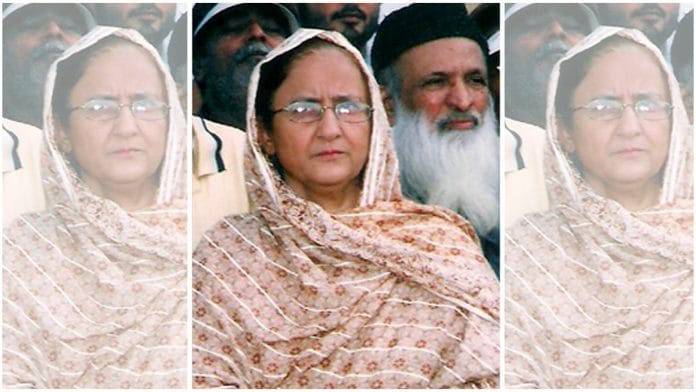New Delhi: Nurse, humanitarian and philanthropist Bilquis Bano Edhi, a towering figure in the field of social welfare in Pakistan and often referred to as the ‘mother of orphans’, passed away at 74 in Karachi’s Aga Khan Hospital Friday due to health complications.
Following her death, Pakistan’s National Assembly passed a resolution recommending that she posthumously receive the country’s highest civilian award, the Nishan-e-Pakistan, for her “unparalleled services to the country”.
During her lifetime, Bilquis was conferred the Ramon Magsaysay Award for Public Service in 1986, which she received along with her husband and philanthropist Abdul Sattar Edhi. She was also recognised with the Mother Teresa Memorial International Award for Social Justice in 2015.
Bilquis served as co-chair of a Karachi-based non-profit, Edhi Foundation, the world’s largest volunteer ambulance network which also oversees homeless shelters and rehabilitation centres among other services. It was founded by her husband, who died in 2016.
One of the hallmarks of Bilquis’ work was the ‘jhoola’ (cradle) project — the placing of metal cribs across Pakistan in an attempt to fight infanticide, specifically female infanticide.
On Saturday, Indian Prime Minister Narendra Modi also conveyed his condolences. “My sincere condolences on the passing of Bilquis Edhi. Her lifelong dedication to humanitarian work touched the lives of people across the globe. People in India too remember her fondly. May her soul rest in peace,” he tweeted.
In 2015, Bilquis had received praise from PM Modi after helping Geeta — a differently-abled woman who had accidentally crossed over to Pakistan a decade ago — return to India. At the time, Modi had announced that India would donate Rs 1 crore as a token of appreciation to the Edhi Foundation. However, Bilquis’ husband Abdul reportedly declined the PM’s offer, with a spokesperson of the foundation saying that the humanitarian did not accept aid from governments or institutions.
Also Read: School ban for Afghan girls, but Taliban leaders’ daughters play football, study medicine abroad
Born in Gujarat, she migrated to Pakistan
Bilquis was born in Bantwa, located in Gujarat’s Junagadh, on 14 August, 1947 — the eve of India’s independence. She, along with her family, however, moved to Pakistan during Partition.
With a strong passion to serve humanity, she joined the Edhi Foundation as a teenager, according to a Dawn report. A nurse by profession, she worked in the foundation’s maternity clinic.
The Edhi Foundation had been founded in 1951 by Bilquis’ soon-to-be husband Abdul Sattar Edhi, who was nearly twenty years her senior. One of the only social welfare programmes in Pakistan at a point in time, it served as a critical haven for people during sectarian riots in Karachi between 1947 and 2007, wrote British author and journalist Jan Goodwin in her book ‘Price of Honor: Muslim Women Lift the Veil of Silence on the Islamic World’.
In her book, Goodwin explained: “Edhi’s two hundred and fifty ambulances are the only ones that will brave the explosive violence and heavy gunfire”. This was also around the time that General Pervez Musharraf had begun his crackdown on militants in Karachi, she further wrote.
‘Jhoola’ project
In 1965, Abdul and Bilquis got married. This was after seven women had consecutively turned down Abdul’s offers of marriage, wrote journalist Peter Osborne in a 2011 report for The Telegraph.
Bilquis eventually took over the reins of the Edhi Foundation’s maternity clinics and philanthropic projects related to women. Abdul created an affiliate organisation to the foundation specifically for such issues, and named it after Bilquis. After Abdul’s death in 2016, Bilquis took charge of all of the foundation’s operations.
One of Bilquis’ most recognised works is the ‘jhoola’ (cradle) project.
The foundation placed ‘jhoolas’ (cradles) outside Edhi homes and centres across the country to counter infanticide, especially female infanticide, as well as neglect and abandonment of babies, especially girls, in Pakistan.
Some of the cradles carried signs that read ‘Do not kill the innocent baby. Do not make the first sin worse’, wrote Goodwin. Babies left in these cribs would eventually be taken into the foundation’s custody and care, after which adoption arrangements would be made.
This service reportedly saved over 42,000 unwanted babies in Pakistan.
However, the book ‘The Dynamics of Conflict and Peace in Contemporary South Asia’ (2020), edited by Japanese professors Minoru Mio, Kazuya Nakamizo and Tatsuro Fujikura, explained why the project received pushback from religious clerics when it was first instituted.
Some clerics understood it as a service that “was encouraging people to bear children out of wedlock”. However, after the project proved to be of valuable social service, people became comfortable coming forward to hand over babies themselves to officials at Edhi centres, wrote the authors.
It is therefore no surprise that Bilquis is often referred to as the ‘mother of orphans’.
Last January, Bilquis was named ‘Person of the Decade’ along with human rights rapporteur of the United Nations Professor Yanghee Lee and the US ethicist Stephen Soldz.
Impact Hallmarks, an international body that conducted the process of conferring the award, described Bilquis, Lee and Soldz as having “stretched and segmented the top of the decade’s impact hallmarks and the opinion poll’s top ‘triarchy’ as well”.
(Edited by Gitanjali Das)
Also Read: In Pakistan, 3 women kill teacher after 13-yr-old dreams of her blasphemy






